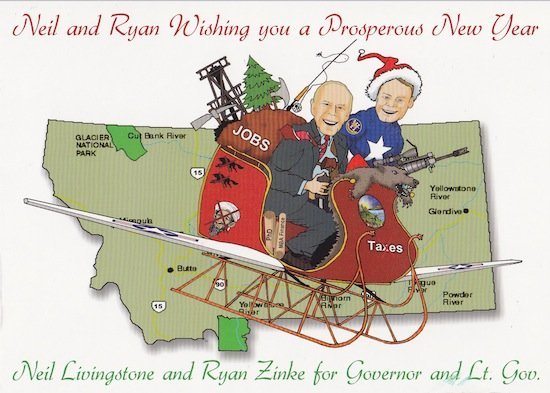It's Time to Tell the President How You Feel About Your Public Lands
Back when I was a Boy Scout on the way to earning my Eagle Scout badge, I spent a lot of time in the outdoors backpacking, climbing, and hiking. Throughout it all leave no trace ideals and awareness were hammered into our skulls. Public lands were ours to enjoy but also ours to protect and conserve for future generations. We were to leave the land we traveled across or camped on in exactly the shape we found it in, if not better.
There were no exceptions to the rule. Protecting the land wasn’t always easy, or convenient. But it was the right thing to do.
Unfortunately, those same tenants of outdoor ethics seem lost on today’s politicians. To put it simply, America’s public lands are at risk. No matter your political stance, it’s vital to weigh in with your elected representatives on a local and national level and make sure your voice is heard.
President Trump’s recent Executive Order 13792 ordered Secretary of the Interior Ryan Zinke to review all national monument designations made under the Antiquities Act of 1906 since 1996. The thinly veiled goal is to give public land back to the states so they can do with it as they wish. I say thinly veiled because if you follow the money, the real objective becomes clear. Big oil knows getting states to sell public land for oil exploration will be a whole lot easier than getting the land through the fed.
It may not always seem like it, with politicians avoiding town halls, but opportunities to connect with our leaders do exist. Whether your representative needs a solid kick in the pants or another encouraging pat on the back, phone calls, letters and protests do work.
As of May 12, President Trump and Secretary of the Interior Ryan Zinke asked the nation to weigh in online and by mail about the fate of 27 national monuments. If you want to weigh in on Bear’s Ears, the lines are only open until May 26, so it’s crucial to make your voice heard now. The other monuments will be up for commentary until July 10.
Here’s what you need to do:
1. Go to Regulations.gov.
2. Enter “DOI-2017-0002” in the search bar.
3. Click “Comment Now” next to “Review of Certain National Monuments Established Since 1996; Notice of Opportunity for Public Comment”
4. Be heard.
Zinke’s name might sound familiar to you. He once thought it appropriate to send out the below Christmas card with a drawing of himself flying a sleigh holding a dead wolf, an oil derrick, an M-16, and a logging axe to his constituents. It doesn’t scream, “I’m an advocate for the conservation of public lands.”
Among the monuments up for consideration are Bears Ears, Grand Staircase-Escalante, Maine’s Katahdin Woods and Waters, and the largest protected area in the world: Papahanaumokuakea National Monument in the Pacific Ocean. There’s a complete list available online.
What Others are Saying
On May 4, Patagonia founder Yvon Chouinard and CEO Rose Marcario sent the following letter to Zinke:
As Secretary of the Interior, you hold the solemn responsibility to steward America’s public lands and waters on behalf of the American people who own them. Our public lands, including the National Monuments you are now reviewing, represent a vital part of our nation’s heritage – a legacy that belongs not just to us, but to all future generations of Americans. It is an important part of your job to safeguard this legacy by making careful and informed decisions about what federal lands can be used for development and what special or vulnerable areas should be preserved for the future.
That is why the arbitrary 120-day deadline for you to review whether to shrink or rescind dozens of National Monuments is absurd. As you know, the process to establish a National Monument often takes years, if not decades. It involves significant study of the area of the proposed monument – including its ecological, cultural, archeological, economic and recreation value – and robust consultation with local communities and their elected representatives at every level. Given the unique and complex histories of each monument, there is simply no way to meaningfully review dozens of individual monuments in such a short period.
You justify this review on the false premise that the American people have not yet been heard on the designation of these National Monuments. But the communities near the National Monuments under your review have already made their voices heard during public input and stakeholder engagement periods prior to designation. For example, notwithstanding the rhetoric of Utah Governor Gary Herbert and members of the Utah Congressional delegation, the designation of Bears Ears National Monument involved years of public input gathered by the Obama administration. This process included a series of public meetings in Southeastern Utah in 2016, including several sessions attended by former Interior Secretary Sally Jewell. It also included significant engagement with the Bears Ears Inter-Tribal Coalition, which represents tribal nations for whom the land is sacred and contains archeological artifacts with immense cultural value. Additionally, in a recent poll, 68 percent of voters in seven Western states said they prioritize the protection of land, water and wildlife for recreation on public land, compared with 22 percent who prioritized increased production of fossil fuels. Your review must account for this extensive record of consultation as you purport to seek public input.
As you undertake this review, we urge you to consider the enormous economic benefits of protected public lands for nearby communities, including many rural areas. A recent study showed that areas in the West with protected lands consistently enjoy better rates of employment and income growth compared to those with no protected lands. In the 22 years since the Grand Staircase-Escalante in Utah was declared a National Monument, jobs grew by 38 percent in two neighboring counties. The designation of 17 national monuments – including nine monuments covered under your review – led to significant increases in per capita income in regions adjacent to the newly-protected areas.
Rescinding or shrinking the National Monuments under review also threatens the fast-growing outdoor recreation economy, which relies significantly on recreation access to protected public lands. These lands are not “locked up,” as the Trump administration has repeatedly declared – they are extremely productive. As you know, since you participated in the outdoor industry’s announcement of a new economic study last week, the recreation economy drives $887 billion in consumer spending every year and supports more jobs (7.6 million) than oil, natural gas and mining combined. Rescinding or shrinking the National Monuments under review would significantly impact the strength of the outdoor recreation economy and limit our ability to create and sustain jobs.
Patagonia has been outfitting outdoors people and protecting public lands for more than thirty years. The debate over land and water conservation is always complex and sometimes divisive. But we have never witnessed the legacy of America’s federal lands encountering greater risk than we see right now. As you visit these protected places and report back to the president, I urge you to follow in the tradition of President Teddy Roosevelt and conserve our shared public lands for future generations.
An open letter from Arc’teryx CEO Jon Hoerauf to the brand’s customers and fans:
I’m certain many of you have been following the recent challenges facing America’s wild spaces, most notably the Bears Ears National Monument.
Bears Ears includes some of America’s most beautiful landscapes. Climbers travel from far and wide to climb Indian Creek’s iconic, vermillion-hued splitter cracks, boaters float the winding San Juan river and others come for the world-class mountain biking, canyoneering and skiing. The region is home to some of the most beautiful scenery on the planet and it has inspired generations of Americans to participate in outdoor sports.
Bears Ears, like all American national monuments, provides a place where we have the opportunity to respectfully explore a protected landscape. National monuments ensure the land will be protected for future generations. National monuments guarantee our children can visit the ancient sequoias in California, mountain bike the Grand Staircase, climb at the Creek and visit archeological sites in Colorado’s Canyons of the Ancients.
I grew up alongside America’s public lands, spending most summers with my family exploring Sleeping Bear National Lakeshore. My first backcountry adventure took place on Isle Royale National Park – and that trip unlocked my spiritual connection with nature. These experiences helped to form my core values and it’s one of the reasons I came to work at Arc’teryx.
Arc’teryx is a collective of people committed to using our influence and resources to conserve and protect public lands. To this end, we committed $150,000 over the next three years to the Conservation Alliance’s Public Lands Defense Fund focused on:
– Defending previous presidents’ national monument designations.
– Defending USA bedrock conservation laws (ie, The Wilderness Act, Antiquities Act, National Environmental Policy Act).
– Opposing proposed transfers of federal lands to the states or to private hands.
The reason we have committed our resources to public lands is because we are at risk of losing them.
Our urgent work begins now: On May 11th, the U.S. Department of Interior opened a 15-day public comment period for individuals and organizations to weigh-in on the future of Bears Ears. We have 10 days left to tell Secretary Zinke, who will report back to President Trump on the monument’s future, why keeping Bears Ears intact is important to our community.
There is a way to save America’s national monuments, but it won’t happen unless we mobilize collectively. Now, more than ever, is time to use our voice to protect wild spaces.
The Conservation Alliance has provided two easy paths to being heard.
Click here for a one-step message to Secretary Zinke. Please personalize your message before you submit your comment:
OR, follow these steps to make comment directly on the Department of Interior’s page:
1. Click this link: https://www.regulations.gov/comment?D=DOI-2017-0002-0001
2. Copy and paste the comment below. Personalize your message before submitting:
RECOMMENDED COMMENT:
As an outdoor enthusiast who loves our public lands, I support the designation of Bears Ears National Monument and ask that its boundaries remain unchanged.
For more than 100 years, Presidents of both parties have used the Antiquities Act–a tool signed into law by Theodore Roosevelt–to enact far-sighted protections for our common American inheritance. Bears Ears is exactly the kind of place the Antiquities Act intended to protect. It is rich in cultural history which inspired a historic coalition of tribes to band together to push for its designation. In addition to protecting over 100,000 archaeological sites, the designation preserves world-class recreation opportunities in places like Cedar Mesa, Grand Gulch, and Indian Creek.
The process that led to the designation of Bears Ears National Monument was thorough and transparent. For more than 80 years, decision makers from all sides presented proposals seeking permanent protection of all or part of this incredible landscape. The boundaries were informed by both the multi-year Public Lands Initiative and by a proposal from the Bears Ears Inter-Tribal Coalition. Those boundaries do not exceed the acreage necessary to preserve the rich cultural heritage, ecological values, and recreation assets.
Thank you for reviewing the decades of hard work and thoughtful consideration that culminated in the designation of Bears Ears National Monument. Please recommend that President Trump leave the current Bears Ears National Monument boundaries in place.
I’m also asking you to take to social media to spread the word.
For Twitter
For Facebook
This opportunity to protect Bears Ears is not the last time we will ask you for your support of public lands. 27 other U.S. national monuments are under review between now and August 24th. We will continue to influence protection of those wild spaces as both a brand and a long-time member of the Conservation Alliance.






